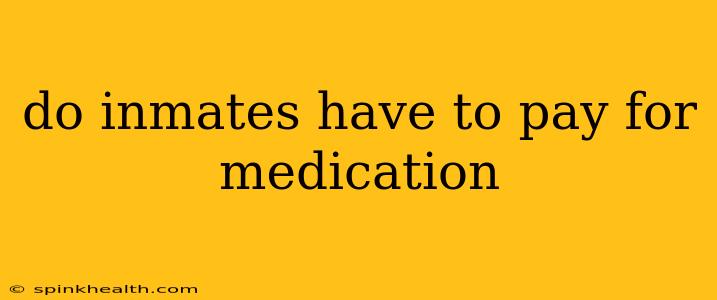Do Inmates Have to Pay for Medication? The Complex Reality of Healthcare Behind Bars
The question of whether inmates have to pay for medication isn't a simple yes or no. It's a complex issue interwoven with legal mandates, prison budgets, the severity of an inmate's condition, and the specific policies of each correctional facility. My journey into understanding this topic started with a conversation with a former corrections officer, and his insights opened my eyes to the nuances of healthcare within prison walls.
Let's unravel this, starting with the basics and delving into the specifics.
What Does the Law Say About Inmate Healthcare?
The Eighth Amendment to the U.S. Constitution prohibits cruel and unusual punishment. This is interpreted by courts to mean that prisons have a legal obligation to provide adequate medical care to inmates. This isn't just basic care; it extends to necessary medications. However, the "adequate" part is where things get blurry. What constitutes adequate care can be debated, and lawsuits frequently arise over alleged denial of necessary medical treatment, including medication.
Do Inmates Pay for Medications? It Depends.
The answer is a resounding "it depends." Some states and correctional facilities provide all necessary medications at no cost to the inmate. This is often the case for chronic conditions like diabetes or hypertension, where the cost of not providing medication far outweighs the financial burden on the system. Denying essential medication for these conditions would be a clear violation of the Eighth Amendment.
However, many facilities implement a co-pay system for medications. This can vary wildly depending on the state, the prison, and even the specific medication. The co-pay might be a small amount, or it could be a significant portion of an inmate's meager commissary funds (the money they earn from prison jobs or receive from family).
What About Over-the-Counter Medications?
Over-the-counter (OTC) medications are generally a different story. Prisons often stock a limited supply of OTC drugs, and inmates usually have to purchase these themselves from the commissary. This can pose a problem for inmates with limited funds or those who need frequent OTC medications.
What if an Inmate Can't Afford Medication?
If an inmate genuinely cannot afford necessary medication, the system should provide it. However, the practical implementation varies greatly. Some facilities have internal processes to address such cases, while others may leave inmates to navigate the system on their own, potentially exacerbating existing health problems. This is often where lawsuits emerge, claiming that the denial of essential medication constitutes cruel and unusual punishment.
How Does the Type of Offense Influence Access to Medication?
The type of offense an inmate committed generally does not directly impact access to necessary medication. The Eighth Amendment's protection against cruel and unusual punishment applies equally to all inmates, regardless of their crime. However, the severity of an inmate's condition and the cost of their medication might influence decisions in borderline cases, creating potential inequalities.
What Role Does Prison Budget Play?
Prison budgets significantly impact the provision of healthcare, including medications. Facilities with limited funds may struggle to provide adequate medical care, leading to potential rationing of medications or delays in obtaining necessary treatments. This can further exacerbate existing health issues for inmates.
In conclusion, the question of whether inmates pay for medication is not straightforward. While legal mandates require adequate healthcare, the practical application varies significantly across states and facilities. A blend of legal obligations, budgetary constraints, and the individual circumstances of each inmate determines the final answer. The system, while striving for legal compliance, often faces significant challenges in ensuring equitable and accessible healthcare for everyone behind bars.

